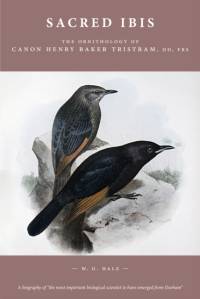Om Sacred Ibis
Henry Baker Tristram was a surprising and remarkable man: explorer, ornithologist, and priest. With his wild beard (for which he required special permission from his bishop) he undertook expeditions to the Sahara and Palestine at a time when doing so was even more fraught with danger than it is today. As a founding member of the British Ornithologists' Union (BOU), he contributed regularly to its journal, Ibis, as well as other scientific journals. Tristram's nickname in the BOU was "Sacred Ibis".
Tristram was a collector par excellence, acquiring extensive collections running to tens of thousands of specimens, primarily of birds, but also of plants, fish, mammals, insects, molluscs, geological samples and archaeological material. He was the first scientist to support Charles Darwin in print, and became a Fellow of the Royal Society in 1868 supported by his great friend Alfred Newton as well as Darwin.
Professor J. B. Cragg, an eminent Zoologist at Durham University, described Tristram as "the most important biological scientist to have emerged from Durham." Tristram took part in the famous "Oxford debate" between Bishop Wilberforce of Oxford and Thomas Huxley. This led to the unfortunate and incorrect assumption that Tristram subsequently gave up his support of Darwin.
This book follows Tristram's epic adventures and love for birds-from his boyhood on the moors of Northumberland to his time as a Residentiary Canon of Durham Cathedral-and the people that influenced him-from his dislike of Gladstone whom he met as a fresher in Oxford to the offer of the Bishopric of Jerusalem by Disraeli (which Tristram declined). In the book are over 80 colour plates and a reproduction of Darwin's first letter to Tristram.
£5 from each sale of the hardback edition of Sacred Ibis will be donated to the Grey College Trust.
Perhaps Tristram's greatest contribution to science was his Fauna and Flora of Palestine. On his deathbed he wrote to his great friend Alfred Newton-who stood down temporarily from his Fellowship of the Royal Society so that Tristram might be elected-thanking him for his friendship.
He and Newton had been a great ornithological partnership and were responsible not only for the development of ornithology as a science but also for the establishment of the conservation movement.
Not everyone these days will approve of his collecting activities, but this is what he did and what was necessary to the development of science in Victorian times. Had the big majority of present-day biologists lived in those times they would undoubtedly have acted similarly, but few would have been so successful.
As his granddaughter wrote, Tristram may not have been a great churchman, but he was a great ornithologist.
Visa mer

